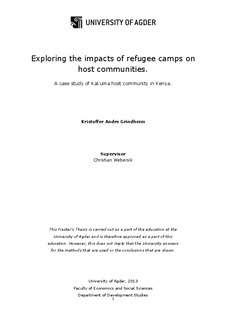| dc.contributor.author | Grindheim, Kristoffer Andre | |
| dc.date.accessioned | 2013-10-03T08:27:34Z | |
| dc.date.available | 2013-10-03T08:27:34Z | |
| dc.date.issued | 2013 | |
| dc.identifier.uri | http://hdl.handle.net/11250/135275 | |
| dc.description | Master thesis in development management – University of Agder 2013 | no_NO |
| dc.description.abstract | The thesis explores how the establishment of a refugee camp has impacted the hosting community of Kakuma and its inhabitants. More specific how the camp establishment has impacted hosts household viability and how they have adapted accordingly. Of equal importance the research is exploring the relationship between host and refugee communities in Kakuma. By interviewing respondents from the host community, refugee camp and external actors of relevance the research addresses the above objectives. The findings are further analyzed in light of a theoretical framework. The remote arid area of Kakuma is located in the Turkana County in north-west Kenya near the border to South Sudan. The inhabitants of Kakuma belong to the pastoralist tribe known as Turkana. The changing reality for Turkana`s in Kakuma of becoming a hosting community to a refugee population significant larger than their own population has brought on many changes, challenges and opportunities. The complexity of camp impacts on the host community has resulted in both positive and negative experiences. Socio-economic impacts have been positive such as new livelihood opportunities in the camp in addition to improvements in social services such as health and education. Negative impacts experiences by hosts have mostly been in term of their relationship with the refugee populations which has resulted in more insecurity and conflicts in the hosting community. The conflicting relationship between hosts and refugees in Kakuma emphasizes the importance of identifying main sources that are creating conflict and coexistence in the relationship for achieving a peacefully relationship. The combination of limited livelihood opportunities in the host community and imbalance of humanitarian assistance are the greatest challenges for promoting more coexistence. Some collaboration between host and refugees are identified at individual levels through socio-economic impacts and humanitarian initiatives. Nevertheless, situations of conflict in the relationship are more common and a challenge towards coexistence. The research reveals that hosts experiences of camp impacts are much related to how their relationship with the refugee population develops. | no_NO |
| dc.language.iso | eng | no_NO |
| dc.publisher | Universitetet i Agder ; University of Agder | no_NO |
| dc.subject.classification | UT 503 | |
| dc.title | Exploring the impacts of refugee camps on host communities : a case study of Kakuma host comunity in Kenya | no_NO |
| dc.type | Master thesis | no_NO |
| dc.subject.nsi | VDP::Social science: 200::Political science and organizational theory: 240 | no_NO |
| dc.subject.nsi | VDP::Social science: 200::Human geography: 290 | no_NO |
| dc.source.pagenumber | 127 p. | no_NO |
